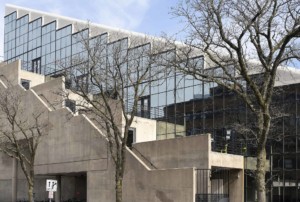
The Harvard Graduate School of Design (GSD) is pleased to announce a new 12-month degree, the Master in Real Estate (MRE), for individuals seeking to acquire core real estate skills while learning how real estate can advance beneficial spatial, social, and environmental outcomes in cities and metropolitan areas worldwide. The school has received a combined $13M in gifts from GSD alumni and friends. The program will accept applications in fall 2022 for up to 25 spaces, with the first class enrolling in fall 2023.
“As our cities, their communities, and the environment face mounting crises, the world needs a new kind of developer, and with this degree the GSD aims to educate leaders in real estate who are prepared to face such complex and urgent ethical challenges,” said Sarah M. Whiting, Dean and Josep Lluís Sert Professor of Architecture.
The MRE program is designed to train future practitioners to address new and urgent realities facing the built environment and cities today. Whether undertaken by for-profit businesses, not-for-profit organizations, or public entities, real estate occupies a pivotal role in determining how the places where we live, work, and play are equitable, environmentally sustainable, and appealing, in addition to being productive for the economy. On top of today’s routine pressures of making real estate projects successful are the effects of climate change, the need for equitable development, shifting boundaries between home and work, online consumerism, and global flows of capital. Today, real estate investors are applying environmental, social, and governance criteria (often referred to as ESG criteria) as new metrics for performance, and regulatory agencies are requiring developers to demonstrate that their projects account for environmental factors. Providing public benefits such as affordable housing is also becoming a common requirement of local development approval.
Jerold S. Kayden, the Frank Backus Williams Professor of Urban Planning and Design and Founding Director of the MRE program, sees the MRE degree as “transformational in its recognition that future success in real estate will depend not only on traditional financial and management skills but on a profound understanding of and responsiveness to the new dynamics of social and environmental conditions.”
Through a cross-disciplinary pedagogy of required and elective courses, concluding with a two-month practicum based at a private or public real estate organization working on a socially and environmentally oriented project, students learn about finance, project and construction management, government regulation, urban economics, public-private partnerships, politics, technology, real estate law, ethics, entrepreneurship, negotiation, leadership, and other subjects essential to the practice of present and future real estate.
“In establishing the Master in Real Estate program as part of the Department of Urban Planning and Design, the GSD recognizes real estate as a critical domain in the production of the built environment spanning many concerns,” said Rahul Mehrotra, Chair of the Department of Urban Planning and Design and John T. Dunlop Professor in Housing and Urbanization. “The program will educate new generations of real estate entrepreneurs who will imagine new possibilities for healthy synergies between property development, government regulation, and social imperatives, all while safeguarding the health of our planet.”
Students enrolled in the MRE program will benefit from being part of one of the largest design schools in the world, with close to 200 faculty members and 900 graduate students, of whom more than fifty percent hail from countries outside the United States. Offering the MRE degree within the GSD’s Department of Urban Planning and Design builds upon its longstanding strengths in real estate education and research and reflects the Department’s intentional synthesis of planning, policy, and design. With nearly a century of experience in studio-based education, the GSD is ideally positioned to tailor instruction to emphasize the holistic and collaborative environment in which real estate projects are successfully launched. The MRE program also benefits from programs and courses offered by Harvard’s 11 other schools, including the schools of business, government, law, public health, and engineering and applied sciences, as well as the Faculty of Arts and Sciences.
In addition, the Joint Center for Housing Studies (overseen by the GSD and the Harvard Kennedy School) as well as the GSD’s Center for Green Buildings and Cities offer an important resource to MRE students. Both centers sponsor applied research and organize public programs and other engagements with private industry and the public sector.